 CENTRAL ENGLAND: Mike Wheeler's concert reviews from Nottingham and Derbyshire feature high profile artists on the UK circuit - often quite early on their tours.
CENTRAL ENGLAND: Mike Wheeler's concert reviews from Nottingham and Derbyshire feature high profile artists on the UK circuit - often quite early on their tours.
 DISCUSSION: John Dante Prevedini leads a discussion about Music and the Visual World, including contributions from Celia Craig, Halida Dinova and Yekaterina Lebedeva.
DISCUSSION: John Dante Prevedini leads a discussion about Music and the Visual World, including contributions from Celia Craig, Halida Dinova and Yekaterina Lebedeva.
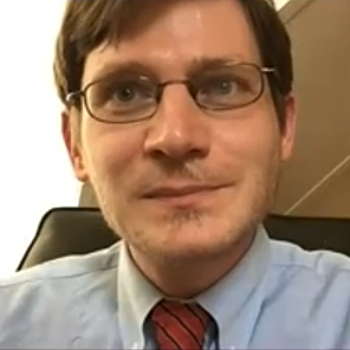 DISCUSSION: Defining Our Field - what is 'classical music' to us, why are we involved and what can we learn from our differences? Read John Dante Prevedini's essay, watch the panel discussion and make your own comments.
DISCUSSION: Defining Our Field - what is 'classical music' to us, why are we involved and what can we learn from our differences? Read John Dante Prevedini's essay, watch the panel discussion and make your own comments.
'Doktor Faust' returns to Florence
GIUSEPPE PENNISI reports on Ferruccio Busoni's opera
The 'Carnival Festival' of the Maggio Musicale Fiorentino has, among its titles, an opera little represented in Italy: Doktor Faust by Ferruccio Busoni - composed between 1916 and 1924, interrupted by the composer's death - in the version completed in 1925 by his pupil Philipp Jarnach. I think it is only the fourth time that it has been staged in Italy: the debut was in Florence in 1942. I remember a good staging in Bologna in 1985 and one at La Scala in 2021. I saw and heard this Florentine production on 11 February 2023.
The myth of Faust (in its many versions) has always fascinated musicians and continues to attract them; for example, this is the theme of a recent work by Silvia Colasanti. Doktor Faust by Ferruccio Busoni, taken mainly from Marlowe, not from Goethe, concludes with the prospect that the descent born from the union between Faust and the Duchess of Parma leads, some day, to redemption. Not only that, but the role of the Doctor is entrusted to a baritone while that of the Devil to a 'pushed tenor' - with a texture almost at the limits of that of a Wagnerian 'heroic tenor'. There is almost a reversal of vocal roles between the 'positive' character of both melodrama and verismo - the tenor - and the 'negative' or at least 'problematic' - the baritone. Busoni did not complete the work, the first performance of which in Dresden in 1925, with the musical direction by Fritz Busch, took place a year after his death. Later performances mainly use a new completion made by Anthony Beaumont in 1982 on original sketches by the composer.
The opera is in repertoire in German and French theaters - especially after a magnificent edition of the Opéra National de Lyon in 1998, revived at the Salzburg Festival and on many other stages - as well as in the American ones, after a very successful production at the San Francisco Opera in 2004. In the early eighties, I listened to a complete version - Philipp Jarnach's - but in concert form, at the Kennedy Center in Washington, where I then lived.
It is a peculiar work, structured in two 'preludes' (in fact, two prologues), an 'interlude', three 'scenes' and an 'epilogue'. On the one hand, it is a typical product of its own time, with many points in common (for example, the role of rediscovered polyphony) with Hans Pfiztner's Palestrina and Paul Hindemith's Mathis Der Maler. On the other, Busoni uses chromatic materials to give a deeper acoustic perspective and reach new and unusual sounds. The protagonist is undoubtedly the Doctor who has a much longer part than that of Mephistopheles, but he is a Doctor fascinated by the occult (with his arts he dialogues with Cagliostro, Don Giovanni, the Wizard Merlin and even Zarathustra). The Devil, however, represents rationality - which leads astray (who can, and wants, to be led astray) and chastises.
In March 2009, the conductor Francesco La Vecchia and the Rome Symphony Orchestra, not having the resources to stage Doktor Faust, had a great idea in re-proposing, after decades, the immense concerto for orchestra, piano and male choir by Ferruccio Busoni. This is a vast (and virtuosic) composition rarely performed both for the difficulties it involves and for the duration (about an hour and twenty minutes). Composed in 1904, it is probably Busoni's best-known orchestral work. Busoni for half of his life worked on the composition of this concerto and for the other half on that of Doktor Faust. The two works are intimately linked to each other.
The concert is articulated in an anomalous way compared to classical standards. After long preparation (four movements for about an hour of music), the spiritual message is entrusted to the choir - the Befehl, the invitation to be happy, aiming at the divinity in its strength and in its existential becoming. Busoni was not a believer: existential becoming becomes his God both in this long concert and in Doktor Faust. After the frenzy of the fourth movement - a tarantella to be performed by a pianist at the limit of the impossibility for the speed and cleanliness required - the orchestra is silent almost suddenly, and two repeated musical notes introduce the 'cantico', fifth and last part. The invitation is a categorical statement from Kantian morality.
Doktor Faust is an eminently philosophical work. Philosophy is better communicated with a concert than with a 'scenic action'. In this sense, the two works are almost complementary. For this reason, I had more than one apprehension when I read that the stage direction of the opera is curated by Davide Livermore, with his usual creative team - Giò Forma for the scenes, Mariana Fracasso for the costumes, Fiammetta Baldisseri for the lighting and D-work for the videos. I must admit that I changed my mind: the scenes, costumes, lighting, special effects, direction and video are perfect and adapt to both the two most abstract 'prologues' and the 'scenic action', set (correctly) in the 1920s - a perfect fit. Great attention was paid to nuances, especially in the interaction between the Doctor and the Devil.
The musical direction was entrusted to Cornelius Meister, who has to his credit various Wagner Rings, also in Bayreuth. The orchestra, very nourished, was splendid, especially in the 'symphonic intermezzo' in which it showed all its ability and versatility. The choir, prepared by Lorenzo Fratini, had almost a leading role in the 'scenic action': of great level both in singing and in dramaturgical presence.
There were numerous soloists - fifteen, some in several parts - so it's impossible to mention them all.
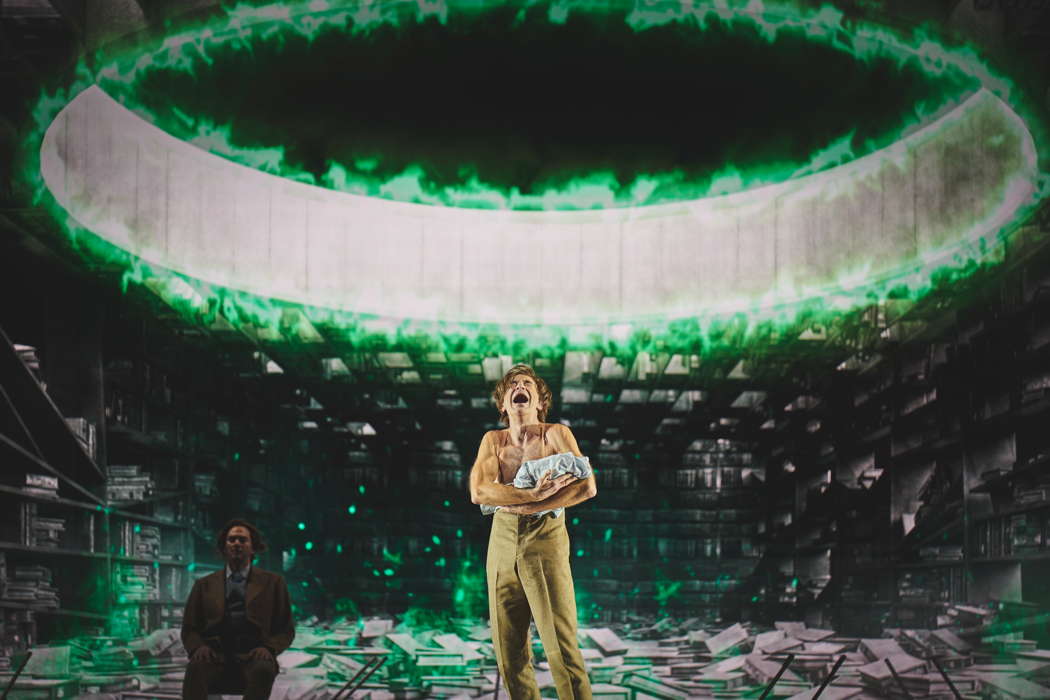
Dietrich Henschel in the title role of Busoni's Doktor Faust in Florence. Photo © 2023 Michele Monasta
Dietrich Henschel is Doktor Faust, a role he has played several times since the Lyon revival. He is a soft and charming baritone whom I consider the heir of Dietrich Fischer-Dieskau. He successfully proposes a tormented Faust who, in the last scene, regains hope and transmits it to the audience.
Mephistopheles is Daniel Brenna, whom I remember in Die Soldaten by Bernd Alois Zimmerman, both in Salzburg and at La Scala. A tenor of great ability, he has several times sung Siegfried in various productions of the Wagnerian Ring. In this Doktor Faust, he excelled for texture and phrasing.
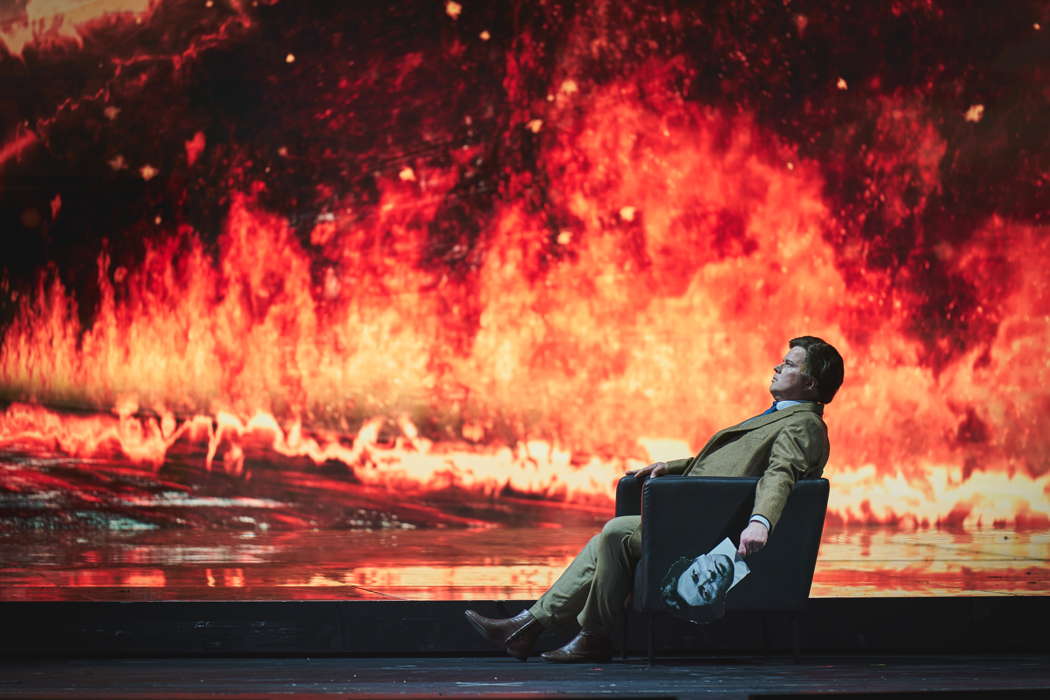
Daniel Brenna as Mephistopheles in Busoni's Doktor Faust in Florence. Photo © 2023 Michele Monasta
The Ukrainian Olga Bezsmertna, a lyric soprano of the Austro-German school, often at La Scala, was a seductive Duchess of Parma.
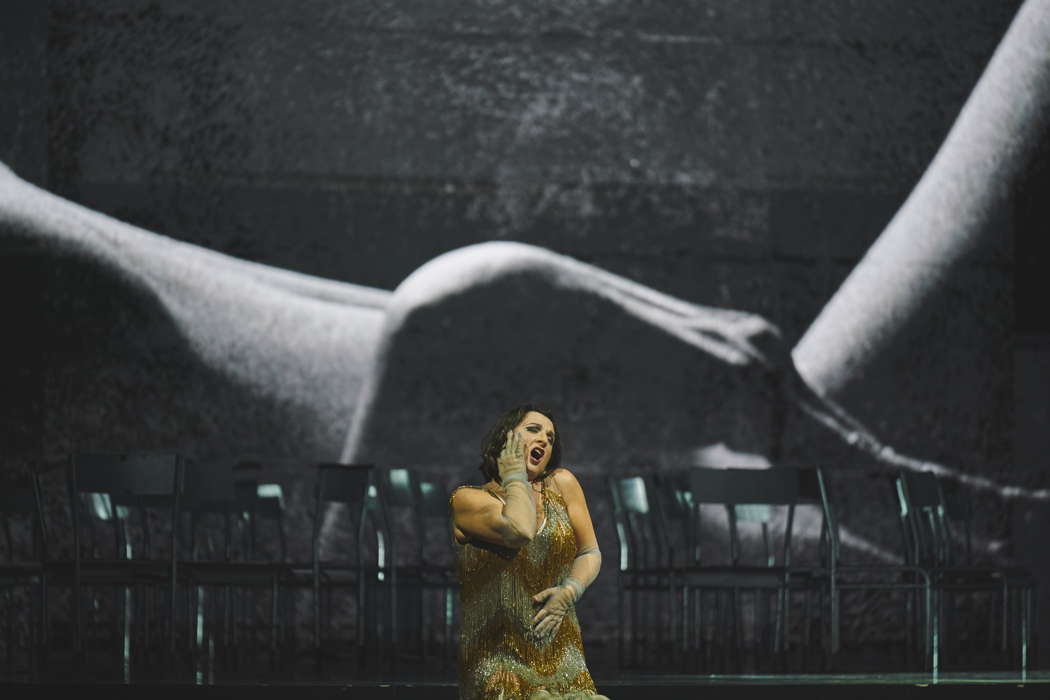
Olga Bezsmertna as the Duchess of Parma in Busoni's Doktor Faust in Florence. Photo © 2023 Michele Monasta
This was a true Festival performance, which must be remembered at the awarding of the Abbiati Prize - the Italian award for music. Doktor Faust waited eighty years to return to Florence. There was a full theater, with lots of applause and accolades.
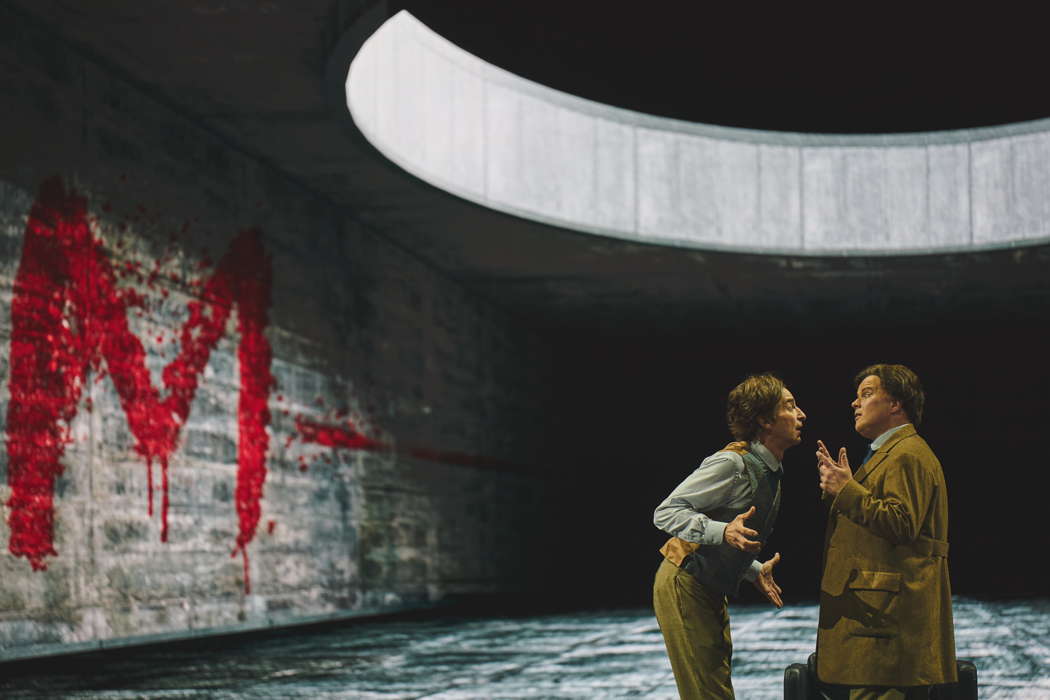
Dietrich Henschel in the title role of Busoni's Doktor Faust with Daniel Brenna as Mephistopheles. Photo © 2023 Michele Monasta
It is time for Florentines to remember another forgotten masterpiece: Ulysses, by their fellow citizen, Luigi Dallapiccola. It has been missing from the city for over half a century.
Copyright © 14 February 2023
Giuseppe Pennisi,
Rome, Italy



